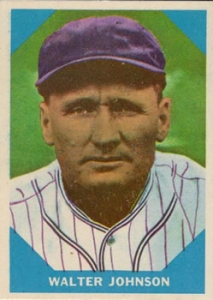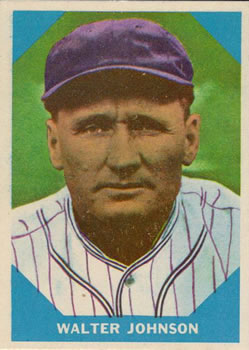September 11, 1925: Walter Johnson wins 20th game of season for 12th and final time
 “Many base ball critics have been trying to pass [him] out of the picture for the past several seasons,” mused D.C. sportswriter John. M. Keller, but Walter Johnson continued to forestall the effects of age.1 The 37-year-old Big Train went the distance to lead the Washington Senators to a 5-4 victory over the Boston Red Sox, thus reaching the 20-win plateau for the 12th and what would prove to be last time in his remarkable career.
“Many base ball critics have been trying to pass [him] out of the picture for the past several seasons,” mused D.C. sportswriter John. M. Keller, but Walter Johnson continued to forestall the effects of age.1 The 37-year-old Big Train went the distance to lead the Washington Senators to a 5-4 victory over the Boston Red Sox, thus reaching the 20-win plateau for the 12th and what would prove to be last time in his remarkable career.
Player-manager Bucky Harris’s defending World Series champion Senators (85-48) occupied first place with a comfortable seven-game lead over the Philadelphia Athletics as the club prepared for its last home stand of the season. Coming off losses in three of their last five contests, the Senators began the 16-game stretch in the nation’s capital with a two-game series against the lowly, last-place Boston Red Sox (39-94).
In a game between teams with the best and worst records in the big leagues, each club sent its ace to the mound. Skipper Lee Fohl called on 31-year-old rubber-armed submariner Howard Ehmke, who had followed up his 20-win, 316 ⅔-inning campaign in 1923 with 19 wins and a league-best 315 innings in 1924. His record thus far in ’25, just 8-17, reflected his team’s woes and dropped his career slate under .500 (122-128). In the twilight of his career, Johnson was at the top of his game. He was coming off an MVP season, having captured the AL pitching crown (23 wins, 2.72 ERA, and 158 strikeouts). It marked the first time in five seasons that Barney had reached the 20-win plateau. Despite missing a month of the ’25 campaign with leg miseries, Johnson entered the game with 19 wins, second-most in the AL, a 396-256 lifetime record, and was pacing the junior circuit with a 2.96 ERA. Johnson “has baffled all opposing clubs,” gushed Keller, and the writer wondered if he might equal his record from the previous campaign.2
It was a sweltering Friday afternoon with temperatures reaching the low 90s as the Nationals and Red Sox took the field for the 3 P.M. start time at Griffith Stadium.3 The champions started in “brisk manner,” noted the Boston Globe, as Sam Rice led off with a double.4 After Bucky Harris popped up in an attempt to lay down a sacrifice, Goose Goslin walked, leading to a series of wild events.5 The team’s primary long-ball threat, Goslin was also dangerous on the basepaths and finished the season with a team-high 27 thefts. Goslin’s presence on first bothered Ehmke, whose third throw over to keep him close “hit [him] in the head and bounced all the way to right field,” according the beat reporter Frank H. Young of the Washington Post.6 While Rice crossed the plate, first sacker Phil Todt retrieved the ball and threw wildly out of third baseman Doc Prothro’s reach. The ball “hit one of the camera men’s ‘boxes,’” continued Young, and bounded back to Prothro, who then threw the ball to the plate erase Goslin.
The Senators tacked on another run in the fifth inning. Coming off an AL-most 216 hits and en route to a career-high 227 safeties in ’25, Rice beat out a single “off Prothro’s glove” with one out and stole second.7 The 28-year-old boy wonder, player-skipper Harris laced an RBI single and moved up a station on left fielder Sy Rosenthal’s throw home, but was left stranded on the keystone sack.8
Johnson looked strong in the early going, yielding only three baserunners in the first four frames. He worked around consecutive one-out singles by Jack Rothrock and Val Picinich in the fifth,9 then was attacked savagely in the sixth. Rookie Roy Carlyle, whom the Senators had traded to the Red Sox on April 29 for Joe Harris, clouted a one-out home run over the right-field wall to cut the lead in half. After Todt doubled to the left-field corner, Prothro smashed a triple in almost the same spot to tie the game. Pitching on three days’ rest, Johnson looked wobbly, but retired Bill Wambsganss on a grounder and then left fielder Goslin made what the Boston Herald described as a “brilliant running catch” on Rothrock’s fly to left to end the threat.10
The resilient Nats took the lead in the seventh. After Bucky Harris reached on a bunt past Ehmke, Goslin lofted a deep shot, his 14th round-tripper of the season, over the right-field wall for a 4-2 lead. Coming off an AL-high 129 RBIs in 1924, the Goose knocked 113 in ’25, the second of 11 times he reached the 100-RBI plateau.
A Senators victory seemed imminent after the Big Train rolled through the seventh and eighth innings without yielding a baserunner and began the final frame with a 4-2 lead. The “Sox become obstreperous in the ninth,” declared the Herald.11 Prothro led off by beating out a bunt when Johnson made no effort to cover first. Wambsganss lofted a routine fly to center fielder Ed McNeely, who had entered the game to begin the eighth as a defensive replacement for Bobby Veach, shifting Rice from center field to right.12 According to Keller of the Evening Star, McNeely “misjudged the ball,” recovered to catch it, then muffed it.13 Boston and D.C. papers were miffed that the miscue was ruled a single for Wamby, putting runners on first and second. Two batters later, Denny Williams, pinch-hitting for Ehmke, hit a lazy grounder to first baseman Joe Judge that should have ended the game; however, Judge “found no one at any of the bases to take a heave for an out,” reported Keller, and the bases were loaded.14 Rookie Sy Rosenthal, who debuted three days earlier, singled to drive in the first two runs of his brief career, to tie the game, 4-4. An exhausted Johnson punched out Ira Flagstead for the third out.
Fohl sent Oscar Fuhr to the rubber in the bottom of the ninth. Not only were the Red Sox the league’s lowest-scoring team, they also possessed the circuit’s highest ERA. A southpaw, Fuhr was winless in five decisions with a bloated 6.54 ERA. “His arrival,” opined Young, “took all the pep out of the party.”15 Goslin led off with a double. Judge executed a perfect sacrifice bunt which Todt fielded but then threw late to Prothro at third base.16 Veteran Hank Severeid, a consistent .300 hitter acquired in a midseason trade with the St. Louis Browns, batted for McNeely and was walked intentionally to load the bases, then ceded to pinch-runner Nemo Leibold.17 Needing a play at the plate to stave off defeat, the Senators got one, but not necessarily what they expected. Fuhr had a 3-and-2 count on Ossie Bluege, who took a low offering for ball four, thus pushing across Goslin for the winning run, ending the game in 2 hours and 14 minutes.
The Senators’ comeback gave Johnson his 20th victory of the season, though it was far from one of his stellar games. He surrendered 11 hits, walked one, and registered just five punchouts. He reached the 20-win plateau for the 12th and final time, moving one ahead of Kid Nichols and trailing Cy Young (who accomplished it 16 times between 1891 and 1908) and Christy Mathewson (13 times between 1901 and 1914).
Johnson’s victory proved to be his last of the 1925 regular season. He made only two more starts during the regular season, suffering from back pain, and finished with a 20-7 slate and a 3.07 ERA in 229 innings. The Big Train almost led the Senators to a second straight title, tossing consecutive complete game victories in Games One and Four in the World Series against the Pittsburgh Pirates, before losing Game Seven, 9-7, on a muddy field on a cold, wet, and miserable day in Pittsburgh, when the game should probably not have taken place.
Sources
In addition to the sources cited in the Notes, the author accessed Retrosheet.org, Baseball-Reference.com, and SABR.org.
Notes
1 John M. Keller, “Johnson May Exceed His 1924 Record; Three American League Clubs in Hot Race,” Evening Star (Washington), September 12, 1925: 13.
2 Keller.
3 “The Weather,” Evening Star, September 12, 1925: 7.
Additional Stats
Washington Senators 5
Boston Red Sox 4
Griffith Stadium
Washington, DC
Box Score + PBP:
Corrections? Additions?
If you can help us improve this game story, contact us.


